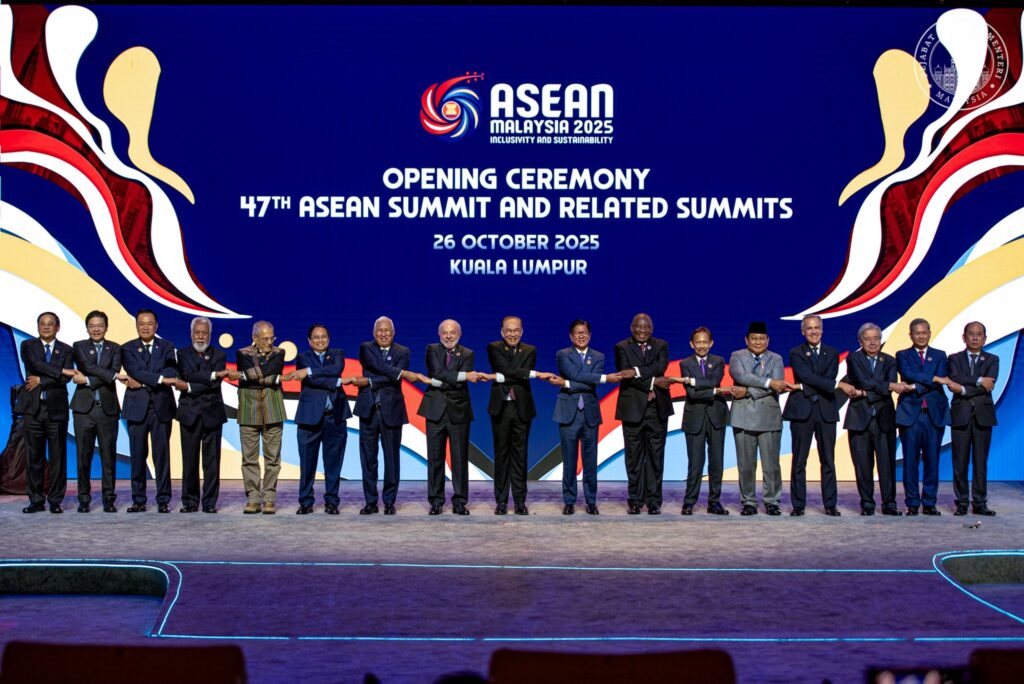Strategic gains, tariff threats, and rare earth tensions converge in Kuala Lumpur as Xi and Trump prepare for their first face-to-face summit—Malaysia emerges as a quiet mediator in a fractured global landscape

By Dr Mohd Safar Hasim
As global attention turns to the anticipated Xi Jinping-Donald Trump summit in South Korea, it is Kuala Lumpur — Malaysia’s capital — that quietly hosted the more consequential groundwork.
While the summit may offer symbolic gestures and photo ops, the real diplomatic heavy lifting occurred in Malaysia, where representatives from both sides met to confront the friction points threatening global stability.
The Tussle Beneath the Surface
The backdrop to this summit is a rapidly intensifying economic standoff. Since early 2025, the U.S. and China have been locked in a cycle of escalation:
* The Trump administration proposed sweeping 100% tariffs on Chinese imports, citing unfair trade practices and national security concerns.
* China responded by tightening its export controls on rare earth elements — materials critical to semiconductors, electric vehicles, and defence systems.
* The U.S. expanded its tech blacklist, barring thousands of Chinese firms from accessing American technologies.
* A 90-day truce negotiated in Geneva earlier this year briefly paused hostilities, but collapsed in September after renewed sanctions and retaliatory export curbs.
These moves have disrupted global supply chains and rattled markets. The Kuala Lumpur consultations were a last-ditch effort to stabilise the situation before the leaders meet face-to-face.
Strategic Wins: U.S. Aligns with Australia and Japan
Despite the turbulence, the U.S. has made notable strategic gains. A new agreement with Australia will lead to the construction of a Kybas rare earth processing plant in Texas, aimed at reducing American dependence on Chinese supply chains. This facility is expected to bolster domestic capabilities in critical minerals and support the semiconductor and defence sectors.
In parallel, U.S.–Japan cooperation has deepened, with joint initiatives in AI governance, quantum computing, and supply chain resilience. These partnerships reflect Washington’s pivot toward trusted allies to build technological and resource security outside of Beijing’s orbit.
Ripple Effects: Tariff Threats and EU Disquiet
However, these achievements are tempered by renewed threats. The Trump administration’s push for more tariffs has prompted China to further restrict rare earth exports, extending licensing requirements to downstream products and technologies. This move has caused disquiet in the European Union, where industries reliant on Chinese rare earths—especially in Germany and France — are facing uncertainty in EV production, green tech, and defence procurement.
The EU’s internal debate now centres on whether to align with U.S. pressure or seek a separate détente with Beijing. This fracture underscores the global stakes of the Xi-Trump summit and the need for a coordinated response to resource nationalism.
Echoes of History: Ambassador Xie’s Call for Shared Prosperity
China’s ambassador to Washington, Xie Feng, framed the moment with a message that transcends trade. Speaking ahead of the summit, he emphasised “mutual respect, peaceful coexistence, and win-win cooperation.”
His remarks invoked the 80th anniversary of WWII cooperation between China and the United States, reminding both nations of their shared history in confronting global threats.
This historical anchoring is more than rhetorical. It’s a strategic attempt to reframe the bilateral relationship not as a zero-sum rivalry, but as a partnership with global responsibilities. In a world facing climate instability, economic fragmentation, and technological disruption, Xie’s appeal for “1,000 reasons to get it right” resonates as both a warning and an invitation.
Malaysia’s Strategic Role and Trump’s Arrival
Malaysia’s hosting of the ASEAN Summit and the economic consultations positions it as a quiet but pivotal actor. Kuala Lumpur’s diplomatic neutrality and logistical readiness make it an ideal venue for de-escalation.
President Donald Trump’s arrival in Kuala Lumpur on October 26 marks his first ASEAN Summit appearance since 2017. His meeting with Prime Minister Datuk Seri Anwar Ibrahim is expected to touch on regional security, trade facilitation, and Malaysia’s role in mediating broader geopolitical tensions. The optics of this meeting are significant: it signals Washington’s recognition of Malaysia’s convening power and its relevance in shaping Indo-Pacific outcomes.
Lessons To Be Learnt
For Malaysian observers, educators, and civic thinkers, this moment offers a rich case study in:
* Regional diplomacy: How Malaysia leverages neutrality and credibility to convene strategic dialogue.
* Resource geopolitics: The role of rare earths as both economic assets and diplomatic leverage.
* Historical memory as diplomacy: How WWII alliances are repurposed to frame modern cooperation.
* Economic interdependence: The risks and opportunities of tariff escalation in a globally integrated market.
This is also a moment to reflect on Malaysia’s own positioning. As the world’s powers recalibrate, Malaysia must continue investing in technical capacity, civic literacy, and strategic foresight. Hosting summits is not enough — what matters is the ability to shape outcomes, mediate interests, and uphold principles.
Beyond the Summit
While the Xi-Trump summit in South Korea may capture headlines, it is the quiet diplomacy in Kuala Lumpur that deserves deeper attention. The city has become a crucible for reset—not just between two powers, but for the broader architecture of cooperation in Asia.
Ambassador Xie’s message of shared prosperity, grounded in historical memory and strategic realism, offers a blueprint for what diplomacy can achieve when it moves beyond confrontation.
Malaysia, by hosting these critical consultations and welcoming both leaders, has shown that even in a polarised world, there is space for dialogue, nuance, and civic leadership.
The views expressed here are entirely those of Dr Mohd Safar Hasim, a Council Member of the Malaysian Press Institute (MPI)